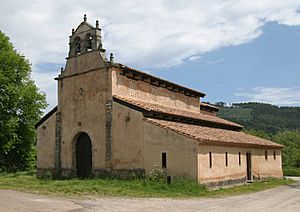Church of San Salvador de Priesca facts for kids
Quick facts for kids Church of the Holy Saviour of Priesca |
|
|---|---|
|
Iglesia de San Salvador de Priesca
|
|
 |
|
| Religion | |
| Affiliation | Roman Catholic |
| Ecclesiastical or organizational status | Church |
| Year consecrated | 921 |
| Location | |
| Location | Villaviciosa (Asturias), Spain |
| Architecture | |
| Architectural type | Church |
| Architectural style | Pre-Romanesque |
| Type | Cultural |
| Criteria | ii, iv, vi |
| Designated | 1993 (17th session) |
| Parent listing | Routes of Santiago de Compostela: Camino Francés and Routes of Northern Spain |
| Reference no. | 669bis-013 |
| Region | Europe and North America |
| Type | Non-movable |
| Criteria | Monument |
| 5 February 1913 | |
| RI-51-0000127 | |
The Church of the Holy Saviour of Priesca, known in Spanish as Iglesia de San Salvador de Priesca, is a very old Roman Catholic church. It is located in Priesca, a small village near Villaviciosa in northern Spain. This church is a fantastic example of Pre-Romanesque architecture from the region of Asturias. It was built a very long time ago, even before the more common Romanesque style became popular.
This church is also part of something very special: it is a World Heritage Site recognized by UNESCO. This means it is considered important for all of humanity to protect and preserve.
Contents
What Makes This Church Special?
The Church of the Holy Saviour of Priesca was officially opened on September 24, 921. It was built during a time when the Kingdom of Asturias was changing. Even though the kingdom was divided, the builders continued to create beautiful churches.
The church's design was inspired by other important churches of its time. It followed the style of Asturian architecture, which is unique to this part of Spain.
Changes Over Time
Like many old buildings, the Church of Priesca has been changed and repaired over the centuries. In the 17th and 18th centuries, some parts of the church were rebuilt. For example, areas next to the entrance hall were connected to the side aisles.
Sadly, in 1936, during the Spanish Civil War, the original roof of the church was damaged by fire. However, much of its beautiful carved decorations and original paintings inside were saved. This means we can still see many of the amazing artworks from when it was first built.
Why Is It a World Heritage Site?
The Church of the Holy Saviour of Priesca is part of the "Routes of Santiago de Compostela: Camino Francés and Routes of Northern Spain" World Heritage Site. This important recognition was given in 1993.
Being a World Heritage Site means the church has outstanding universal value. It helps us understand the history and art of the past. It is a cultural treasure that needs to be protected for future generations to enjoy and learn from.
See also
 In Spanish: Iglesia de San Salvador (Priesca) para niños
In Spanish: Iglesia de San Salvador (Priesca) para niños
- Asturian art
- Catholic Church in Spain
 | Anna J. Cooper |
 | Mary McLeod Bethune |
 | Lillie Mae Bradford |

